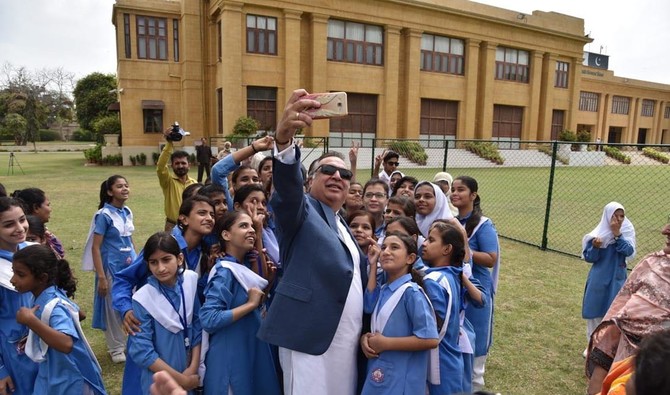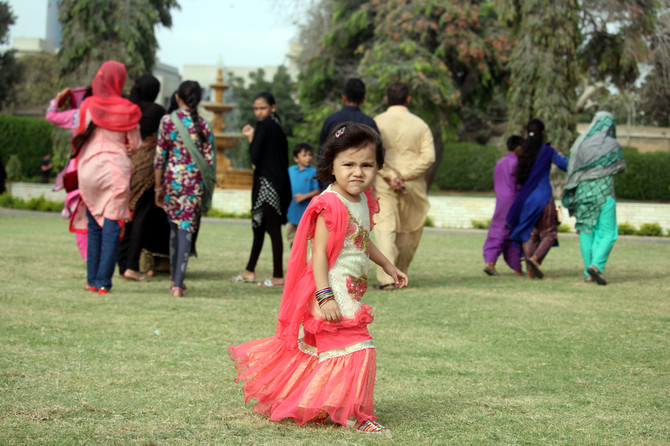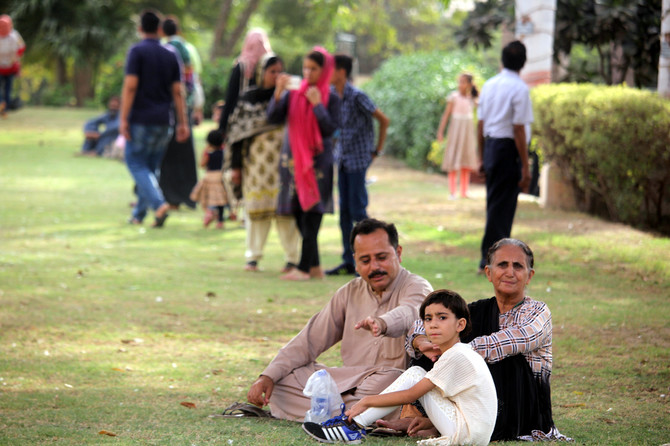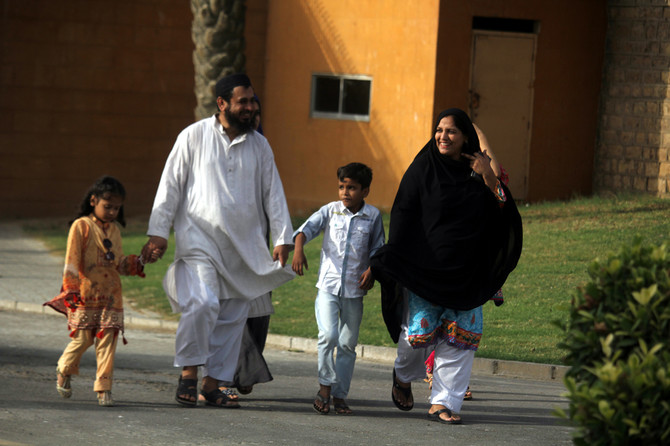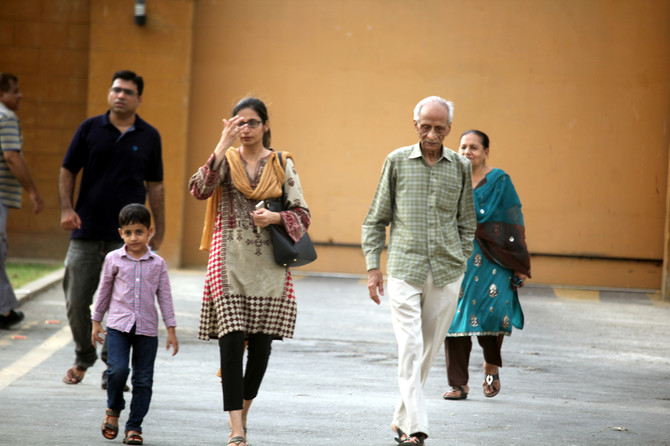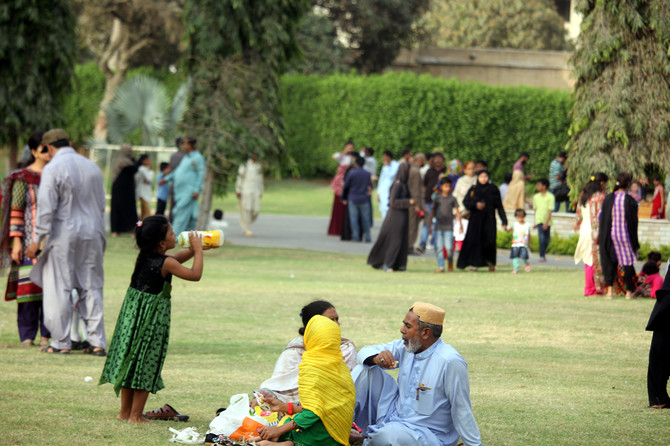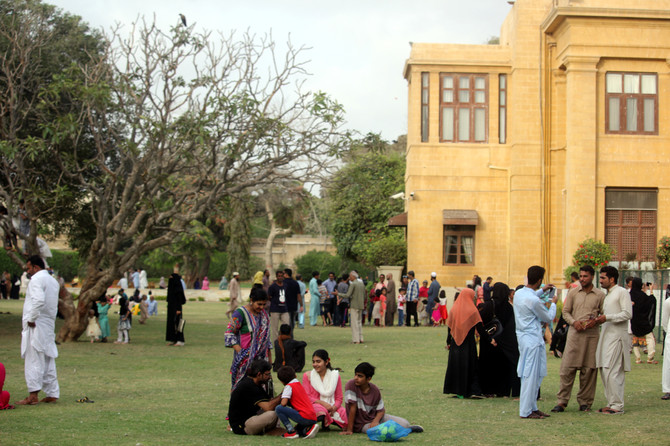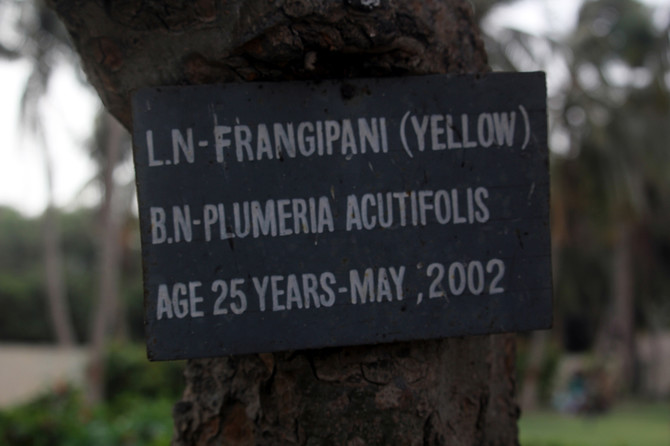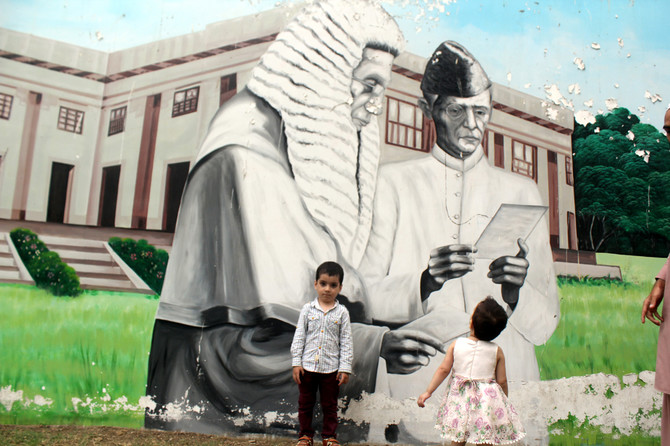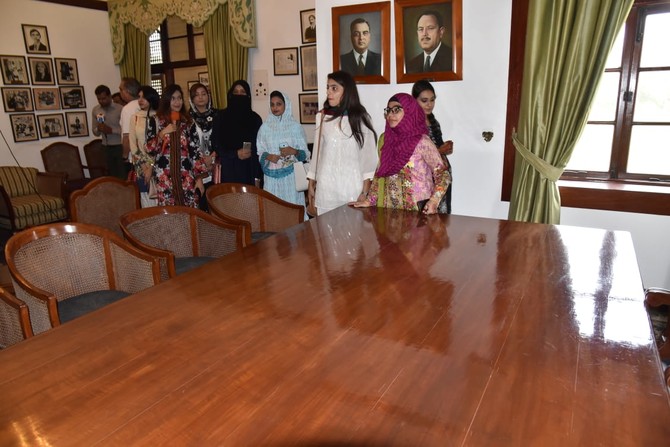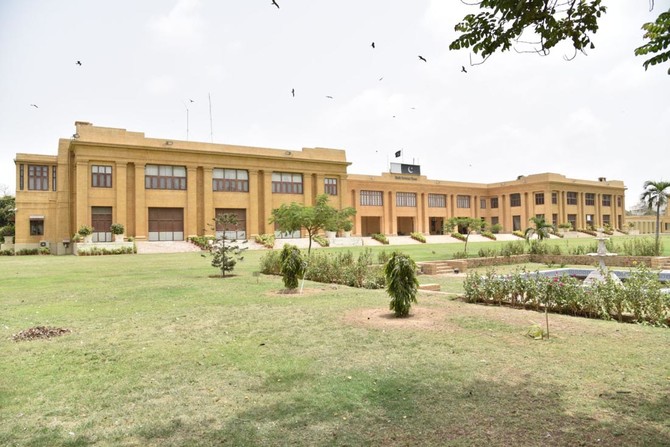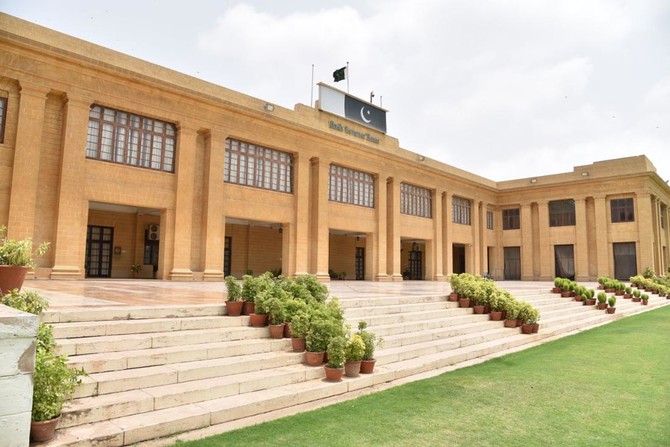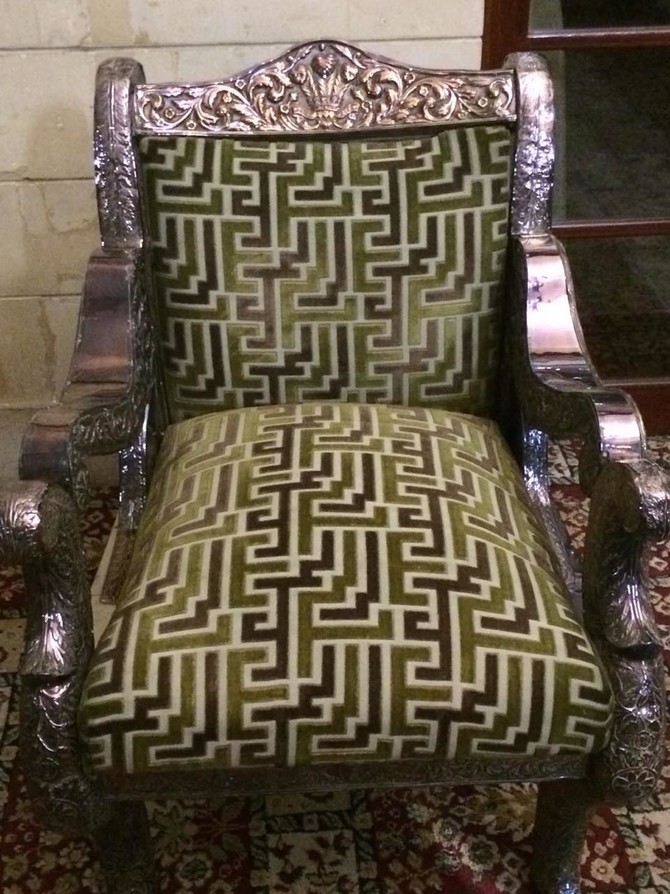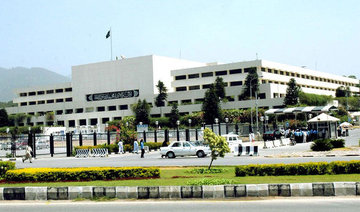KARACHI: Sindh’s new governor, Imran Ismail, won over several residents after he saw through his promise and opened the Governor House for visitors on Sunday.
Ismail, who is also a prominent Pakistan Tehreek-e-Insaf (PTI) party leader, had vowed to allow students and families access to the historic building after being sworn in on August 27.
Maintaining that his official residence was a “national heritage”, Ismail said on Friday: “In the first phase, visitors will be able to access the park inside the facility. In the second phase, we will start guided tours to some portions of the building.”
There was an overwhelming response to the decision, with hundreds queuing up to get into the building and Ismail personally greeting and taking pictures with the visitors.
“We used to see the outer walls of this building, knowing it was only frequented by influential people,” Razia Anwar, a resident of the city, told Arab News. “But Imran Khan and his party have made us feel special. We are now waiting for the time when they will open the Prime Minister House to the public too,” she said.
Others were not very impressed. “We can visit parks anywhere in the city,” Ahmed Ali, 42, said. “They should also open other portions of the building.”
Tahir Hasan Khan, a senior political correspondent, explained that the Governor House was once open to students, but later closed due to “security reasons”. “After assuming charge as the province’s governor in March 1997, retired Lt. Gen. Moinuddin Haider prohibited that for security reasons. The general public, however, was never allowed inside, and the PTI should, therefore, be hailed for this decision,” Khan said.
He also suggested that the authorities should have proper procedures in place, such as guided tours, for a seamless visit.
His thoughts were echoed by those people unable to get through the gates. “I was in the queue since 5pm,” Shahreyar Khan, a resident of the city, said. “But I was asked to go back when entry time was over. They need to have better procedures. Only those people who book in advance should be allowed inside,” he said.
The original building was constructed by Sir Charles Napier for his personal use in 1843. The government of India “purchased it from him when he left in 1847 following which the structure was occupied by Sindh’s Commissioner”, Saleem Khan, a Governor House spokesperson, said. The construction of the new Governor House began in 1936.
“The suite occupied by the Quaid-e-Azam (Muhammad Ali Jinnah) and Mohtarma Fatima Jinnah is called the Royal Suite. It was later used by visiting heads of state and other important personalities,” the spokesperson said.
The building’s Darbar Hall, where oath-taking ceremonies are held, houses a historic throne that was made for King Edward VII, during his tour of India as the Prince of Wales, in 1876. It was also used by Queen Mary during the coronation of Emperor George V, in Delhi, in 1911.
“The main lawn and terrace are the place where Quaid-e-Azam took the oath as the first Governor General of Pakistan,” Khan said. “Several other governor generals, presidents and governors of Sindh have also received salutes on national days from smartly turned out contingents of young and energetic soldiers.”
Besides the historical nuggets that the place has to offer, it also houses a priceless relic — exhibited near the entrance of the Darbar Hall. A piece of cloth that adorns the Kaaba in Makkah, the “kiswat Al-ka`bah” was gifted by King Faisal of Saudi Arabia and is beautifully-encased in a glass frame.
The building was called Governor General House until 26 March 1956, when Iskander Mirza became the first president of the country. It remained President House until July 1970 when it was renamed Governor House.
Taking cognizance of Prime Minister Imran Khan’s austerity drive – where he intends to convert official residences into educational institutes – Ismail said that the fate of the Governor House had yet to be decided. “A committee is already working on the idea and will soon present its recommendations to the prime minister on alternative uses of these buildings.”
Visitors can access the building from 6am to 10am on weekdays and 4.30pm to 6.30pm on Sundays.
Hundreds throng to Governor House as Sindh opens doors to public
Hundreds throng to Governor House as Sindh opens doors to public

- Historic building was constructed during the British colonial period and also used by Pakistan’s founding fathe
- Governor Ismail welcomes visitors to his official residence considered by many as a “national heritage”
President of Azad Kashmir invites China to explore investments in disputed region

- Move is likely to draw the ire of archrival India which like Pakistan claims the Kashmir region in full
- Since 1947, Pakistan and India have fought three wars over Kashmir, engaged in regular border skirmishes
ISLAMABAD: Azad Jammu and Kashmir (AJK) President Sultan Mahmood Chaudhry has invited Chinese businesses and companies to invest in different sectors of the Pakistan-controlled disputed region, state media reported on Wednesday, in a move that is likely to draw the ire of archrival India.
The Muslim-majority Kashmir region has long been a source of tensions between nuclear-armed neighbors India and Pakistan, leading them to fight three wars since winning independence from the British Empire in 1947. The scenic mountain region is divided between India, which rules the populous Kashmir Valley and the Hindu-dominated region around Jammu city, Pakistan, which controls a wedge of territory in the west called AJK, and China, which holds a thinly populated high-altitude area in the north. Besides Pakistan, India also has an ongoing conflict with China over their disputed frontier.
Since both India and Pakistan tested nuclear weapons in 1998, Kashmir has become one of the world’s most dangerous flashpoints. Islamabad says a UN-mandated referendum should take place to settle the dispute over the region, expecting that the majority of Kashmiris would opt to join Pakistan.
On Tuesday, the president of AJK, which is administered by Pakistan as a nominally self-governing entity, met Li Ping, the director of China’s Yunnan Sunny Road and Bridge Company, and briefed him about “massive investment opportunities” in the region, APP reported.
“Seeking Chinese companies investment in different economic sectors of the State including mining and tourism, he said that the AJK government was ready to offer all kinds of facilities and support to investors,” state media said, as Sultan briefed the visiting Chinese business leader about the tourism potential of the region as well as its abundance of natural resources and precious stones, especially rubies and other minerals.

Li gave a detailed briefing to Sultan about the aims, objectives and business activities of his company, which specializes in tunnels, highways and other construction sectors.
“He also expressed his company’s desire to start its projects in Azad Kashmir,” APP said. “The President expressed satisfaction over Yunnan Sunny Company’s desire and said that the AJK government would welcome foreign investment.”
Beijing has already pledged investments in AJK under the China Pakistan Economic Corridor scheme, including the Karot and Kohala hydropower projects, the construction of M-4 motorway, and a Special Economic Zone at Mirpur.
After the partition of the subcontinent in 1947, Kashmir was expected to go to Pakistan, as other Muslim majority regions did. Its Hindu ruler wanted to stay independent but, faced with an invasion by Muslim tribesmen from Pakistan, hastily acceded to India in October 1947 in return for help against the invaders.
The dispute over the former princely state sparked the first two of three wars between India and Pakistan after independence. They fought a second in 1965, and a third, largely over what became Bangladesh, in 1971.
A UN-monitored ceasefire line agreed in 1972, called the Line of Control (LOC), splits Kashmir into two areas — one administered by India, one by Pakistan. Their armies have for decades faced off over the LOC. In 1999, the two were involved in a battle along the LOC that some analysts called an undeclared war. Their forces exchanged regular gunfire over the LOC until a truce in late 2003, which has largely held since.
India accuses Pakistan of backing a separatist insurgency in its portion of Kashmir that began in 1989, in particular by arming and training fighters. Pakistan denies this, saying it only offers political support to the Kashmiri people.
Pakistan issues drought alert for multiple regions due to scarce rainfall

- Rainfall was 40 percent lower than normal across Pakistan from Sept. 1, 2024, to Jan. 15, 2025
- In Sindh, rainfall was 52 percent lower than normal, Balochistan 45 percent, Punjab 42 percent
ISLAMABAD: The Pakistan Meteorological Department (PMD) has issued a drought alert for several parts of the country, warning of worsening conditions due to below-normal rainfall and rising temperatures, state-run APP reported on Wednesday.
Pakistan has the fourth-highest rate of water consumption in the world. The country’s agriculture sector uses the most amount of fresh water than any other sector. Rainfall has steadily declined over the past few decades and experts have been warning for years the country will approach “absolute scarcity” of water by 2025.
According to the PMD advisory, which followed one issued on Dec. 9, rainfall from Sept. 1, 2024, to Jan. 15, 2025, was 40 percent below normal across Pakistan, with Sindh, Balochistan, and Punjab being the most affected provinces where rainfall deficits of 52 percent, 45 percent, and 42 percent respectively have been recorded.
“The drought is particularly affecting rain-fed areas,” APP said. “Drought conditions are likely to aggravate in the coming months due to limited rainfall and above-normal temperatures, which may lead to moderate drought in some regions. Flash droughts are also anticipated.”
The advisory said in Punjab province, mild drought conditions had been observed in Attock, Chakwal, Rawalpindi/Islamabad, Bhakkar, Layyah, Multan, Rajanpur, Bahawalnagar, Bahawalpur, Faisalabad, Sargodha, Khushab, Mianwali, and Dera Ghazi Khan.
Sindh province was experiencing similar conditions in Ghotki, Jacobabad, Larkana, Sukkur, Karachi, Hyderabad, and Tharparkar, while in Balochistan, affected areas included Ormara, Kharan, Turbat, Panjgur, Lasbela, Dalbandin, and adjacent regions.
The results of the latest census in 2023 counted 241.49 million people across Pakistan with a growth rate of 2.55 percent. Linked to that, per capita water availability has been on a downward trend for decades.
In 1947, when Pakistan was created, the figure stood at about 5,000 cubic meters per person, according to the World Bank. Today it is 1,000 cubic meters. It will decline further with the population expected to double in the next 50 years, climate change experts say, pointing out that Pakistan needs intervention on a range of water-related issues: from the impact of climate change to hydropower, from transboundary water-sharing to irrigated and rain-fed agriculture, and from drinking water to sanitation.
Pakistan finmin discusses financial cooperation, banking sector partnerships with Saudi National Bank chairman

- Muhammad Aurangzeb meets SNB chairman at sidelines of World Economic Forum summit in Davos
- Pakistan’s finmin meets Egypt’s planning minister, discusses ongoing projects between two countries
ISLAMABAD: Pakistan’s Finance Minister Muhammad Aurangzeb met Saudi National Bank Chairman Saeed bin Mohammed Al-Ghamdi on Tuesday to discuss financial cooperation and strengthening banking sector partnerships between the two countries, Pakistan’s finance ministry said.
The meeting between the two officials took place during the sidelines of the World Economic Forum (WEF) summit in Davos, which will be held till Jan. 24 under the theme: ‘Collaboration for the Intelligent Age’.
Pakistan and Saudi Arabia are close regional partners and economic allies, with both countries signing 34 agreements worth $2.8 billion in October 2024.
“The two leaders discussed potential financial cooperation between Pakistan and Saudi Arabia, particularly focusing on strengthening partnerships in the banking sector,” the finance ministry said in a statement.
Aurangzeb briefed Ghamdi about Pakistan’s economic progress and the improvements made by the South Asian nation in its international financial rankings.
“Both sides expressed their commitment to further deepen economic ties for mutual benefit,” the ministry said.
Meanwhile, the Saudi Export-Import Bank and Pakistan’s Bank Alfalah also signed a $15 million financing agreement, strengthening access to Pakistani markets and boosting trade and economic ties.
Separately, Aurangzeb also met Egyptian Minister of Planning, Dr. Rania Al-Mashat at the sidelines of the summit. The two ministers discussed ongoing programs and projects between Pakistan and Egypt, the finance ministry said.
“The two ministers agreed to continue discussions on economy and finance and learn from each other’s experiences,” the statement said.
Saudi EXIM Bank signs $15m deal with Pakistan’s Bank Alfalah to boost trade

- Agreement designed to enhance Kingdom’s exporters access to Pakistani markets
- In October, businesses from both countries signed agreements worth $2.8 billion
RIYADH: The Saudi Export-Import Bank and Pakistan’s Bank Alfalah have inked a $15 million financing agreement, designed to enhance Kingdom’s exporters access to Pakistani markets and foster stronger trade and economic ties.
The new credit line deal seeks to increase the flow and competitiveness of the Kingdom’s non-oil exports as well as unveil new trade horizons between the two countries, the Saudi Press Agency reported.
This falls in line with Pakistan’s efforts to strengthen trade and investment ties with the Kingdom, with the Saudi government reaffirming its commitment in September to fast-track a $5 billion investment package for the Asian country.
This also aligns with Saudi EXIM’s goal of diversifying the Kingdom’s economy by offering financing and insurance products for non-oil exports in support of Vision 2030.
“The agreement comes within the bank’s efforts to strengthen strategic relations with international banks and financial institutions to provide financing solutions that contribute to the development of Saudi non-oil exports and enhance their competitiveness in Pakistani markets, by encouraging importers from Pakistan to import Saudi products and services, which opens up broad prospects for the development of trade and investment between the two countries, and creates more promising trade and investment opportunities,” said General Director of the Finance Department at Saudi EXIM Bank Abdul Latif bin Saud Al-Ghaith.
The Group Head of Corporate, Investment Banking, and International Business at Bank Alfalah, Farooq Ahmed Khan, said: “The agreement between Saudi EXIM Bank and Bank Alfalah Ltd. is a milestone in strengthening trade relations between the Kingdom and Pakistan.”
He added: “The financing line will enable Pakistani companies to access high-quality products in the Kingdom and will also enhance the volume of trade exchange between the two countries.
“We at Bank Alfalah are proud to play a pivotal role in promoting trade and investment opportunities that are in line with the shared vision to strengthen and grow the economies of both countries.”
In October, Saudi businessmen expressed hope for successful collaborations in Pakistan, saying the country’s economic stability and improved regulatory framework had made it an attractive investment destination, following the signing of over two dozen deals between companies from both nations.
Pakistan condoles loss of lives as Turkiye ski resort fire kills 66

- Fire erupted overnight in hotel of Turkiye’s Kartalkaya ski resort
- Pakistan stands shoulder-to-shoulder with Turkiye, says foreign office
ISLAMABAD: Pakistan’s foreign office on Tuesday condoled over the loss of lives caused by a deadly fire at a ski resort in Turkiye that killed at least 66 people and wounded over 50 others.
The blaze erupted overnight in the restaurant of the hotel in the famous Kartalkaya ski resort in Bolu province on Monday.
Television footage showed the roof and upper floors of the building engulfed in flames as witnesses and reports indicated that the hotel’s fire detection system had failed to activate.
As per reports, 234 guests were staying at the hotel when it caught fire.
“The government and people of Pakistan are deeply saddened by the devastating fire at a hotel in the Kartalkaya ski resort in Bolu, Türkiye this morning,” the foreign office said.
“Pakistan extends its heartfelt condolences to the Government and people of Türkiye, particularly to the families who have lost their loved ones.”
The foreign office said Pakistan stands shoulder-to-shoulder with Turkiye, reaffirming its solidarity with the nation.
According to the state-owned Anadolu Agency, Turkish Justice Minister Yılmaz Tunç said four people, including the business owner, were detained over the fire incident.
He said six public prosecutors were assigned to the probe, adding that a team of experts were looking into the cause of the fire.
Kartalkaya, which lies about 295 kilometers east of Istanbul, is one of Turkiye’s premier winter tourism destinations that attracts thousands of visitors every winter.


